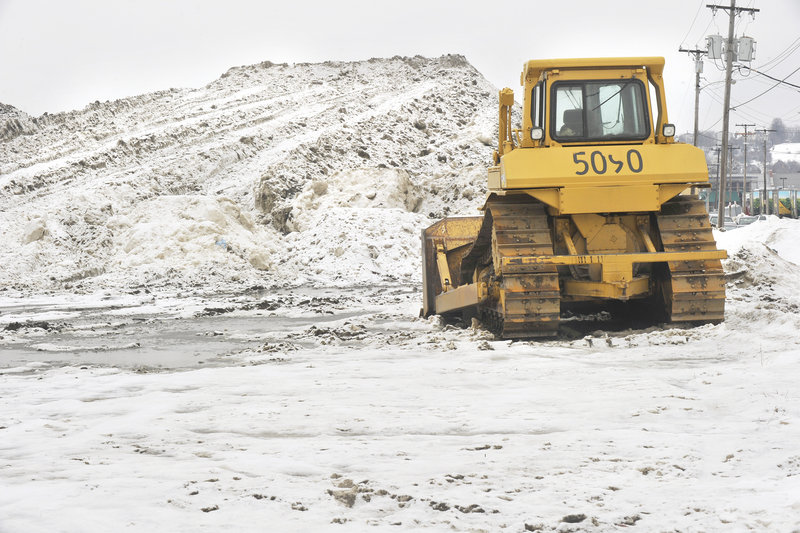This time of year, Maine cities and towns are busily removing towering snowbanks to make roads and sidewalks safe, and trucking the piles to snow dumps.
Under state regulations aimed at protecting water quality, the dumps must be away from rivers and streams, partly surrounded by silt barriers and, by June 30, cleared of the trash that’s left behind when the snow melts.
Now a bill backed by the Maine Municipal Association would let cities and towns dump the snow wherever they want – including into lakes, rivers and coastal bays – without permission from the state Department of Environmental Protection.
Municipalities that support the measure say snow dump rules cost them money and create their own environmental problems. But some environmental groups say that abolishing the regulations would threaten water supplies, kill fish and contaminate shellfish beds.
The bill, sponsored by Rep. Sheryl Briggs, D-Mexico, has created another battle over environmental regulations in the early days of Gov. Paul LePage’s administration. The snow dump requirements are on LePage’s list of rules that he wants to abolish or weaken to make the state more friendly to businesses and create jobs.
Briggs said she sponsored the bill to review the regulations, not necessarily to abolish them.
“I am not saying it is a good idea, but I am saying the discussion should come forward,” said Briggs, who is executive secretary for the town of Mexico.
Briggs’ boss, Town Manager John Madigan, is lobbying for the change. He said the rules cost the town money and don’t prevent pollution.
Mexico is one of about 10 municipalities in Maine that pay $315 a year to operate snow dumps that do not conform to DEP regulations.
“The bottom line is, we are along the Androscoggin River, and when the snow melts it is going to get there anyway,” Madigan said.
He said the town used to pile the snow it removed from its downtown behind the town hall, which is on the river. Now it hauls the snow to a dump four or five miles away.
The new dump is licensed by the DEP, but the town has to pay the $315 fee because the site is over an aquifer.
Madigan said that moving the snow dump has created its own problems, driving up the cost of transporting the snow and sending more diesel fumes from dump trucks into the air.
He said the snow dump license fee is just one of a number of fees charged to towns by the state, and those costs add up.
“The state keeps taking money away from us, and all we can do is pass it on to property taxpayers,” Madigan said.
He said he is skeptical that snow dumps pollute, and he questions the research on which the regulations are based.
Environmental groups say there is no question that snow dumps pollute and they need regulation.
Joe Payne, baykeeper for the Friends of Casco Bay, said snow is dirty even before it hits the ground because it collects pollutants from the air as it falls. On the ground, it mixes with oil, dirt, road salt, litter and other material on the roads.
“There are plenty of studies that show how polluted snow is. You dump it into the water and the pollutants go into the mud. It is one thing that is preventable,” Payne said.
Geoff Herman, director of state and federal regulations for the Maine Municipal Association, said Rep. Briggs’ bill was supported by the association’s 70-member policy committee. He said clearing roads and sidewalks of snow is a public safety issue, not a pollution issue.
Herman said the bill would help cities and towns that don’t own property suitable for snow dumps under current rules.
“It has been a real limitation about where they can put the snow,” he said.
Stephen Hinchman, lawyer for the Androscoggin River Alliance, said that if the DEP no longer issues snow dumping permits, any dumps that discharge into waters will violate federal law and expose cities and towns to lawsuits.
Some municipalities say they welcome the snow dump rules because they protect water supplies.
“I don’t think the regulations have been onerous at all,” said Mike Bolduc, Saco’s public works director.
When Saco’s snow dump melts in the spring, he said, it leaves behind a pile of debris that would otherwise go into storm drains and, ultimately, the Saco River.
Portland officials said that even if the snow dump regulations are abolished, the city will keep its controls to minimize the environmental impacts.
The city piled snow in a vacant lot in the Bayside neighborhood until it got full. Truckloads of snow are going now to a site on outer Congress Street.
“We will continue to be good environmental stewards,” said Nicole Clegg, the city’s spokeswoman.
Staff Writer Beth Quimby can be contacted at 791-6363 or at: bquimby@pressherald.com
Send questions/comments to the editors.




Success. Please wait for the page to reload. If the page does not reload within 5 seconds, please refresh the page.
Enter your email and password to access comments.
Hi, to comment on stories you must . This profile is in addition to your subscription and website login.
Already have a commenting profile? .
Invalid username/password.
Please check your email to confirm and complete your registration.
Only subscribers are eligible to post comments. Please subscribe or login first for digital access. Here’s why.
Use the form below to reset your password. When you've submitted your account email, we will send an email with a reset code.